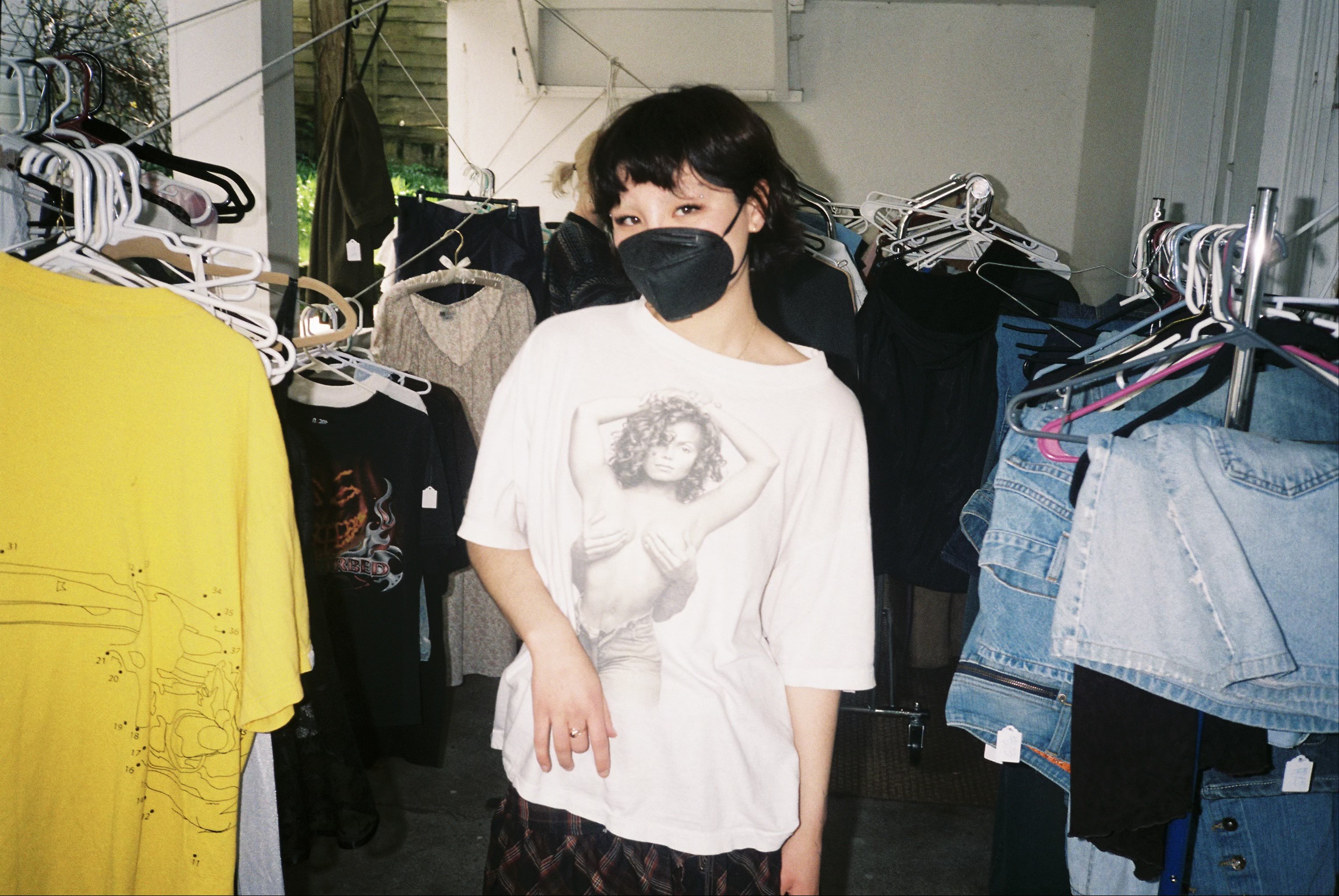By: Tim Donahue
Our faces have been covered for the majority of the past two years. A mask is at once a political statement, a declaration of care for the health of those around you and a whitewashing that blurs the uniqueness of a face into uniformity. It’s easy to imagine a person in a mask as an automaton, a gray mouth covering a body adorned by the doldrums that have defined the past two years of our lives. Masks have been a necessity, but they have also heightened our need to illustrate personality in ways that go beyond the face.
That’s where Jade Weston and Emily Hayes come in: wearing your personality as a living art piece that evolves along with you and the outfits you choose. There’s a unique streak that comes out of anything collectively shared, as a pandemic, and innovation turns into sustenance when we are all cast as one.
Sophomores Weston and Hayes live and breathe their work. While walking into their living room, my eye was caught by racks that spilled clothing and lined the walls like fine art in a Victorian mansion. A kind of second-hand elegance, it felt warm to sit among the clothes. Like a closet of care that stacked around the walls. I melted into the couch and started our interview inside the jungle of furniture.
Weston started collecting vintage clothing five years ago, since then—through resale on Depop and her bustling clothing markets—she has managed to establish what many students can only dream of, an ability to meld her studies into a way of living away from the constrictions of a traditional nine-to-five.

As an Environmental Studies major, Weston is quick to mention the sustainability of her business. Her face lights up when she is questioned about the possible connections that can be made between a second-hand clothing business and her work in environmentalism.
All of their clothes are recycled, the forest of clothing racks act as a kind of curation service for shoppers that are interested in the point where unique style meets sustainability. Think of a thrift store where all the clothes are worth your time. Hand-picked to reflect a uniquely Northwestern style, Jade and Emily stand at the forefront of a consumer-base where two things matter above all else in terms of fashion: uniqueness and responsibility.
They moved to Bellingham this past summer, and although they started their clothing markets in Seattle, they agree that Bellingham is the place where their business belongs. Nestled right on the hip of campus, they feel Western’s community has the perfect blend of environmental consciousness and progressive fashion sense to allow their business to thrive.
“About 70% percent of the people here are thrifting anyways.” Weston mentioned when talking about how the community has helped to grow her business.
With such a desire for second-hand clothing, Weston and Hayes act as a curation service, picking over the thrift stores and second-hand shops so we don’t have to.

I trudged to an early April clothing market to see what the hoopla was all about. Following the signs in my jeans and jean-jacket, I turned the corner expecting to be lost but my ears led me the rest of the way. The Velvet Underground guided me along the last leg of my journey. “Sweet Jane” played on the speakers and I knew I was in the right place. Hayes was off doing a set for K.U.G.S. (hence the market’s great soundtrack) and Weston had taken over to run the ship while she was gone.
Shopping, talking, browsing, buying—I could’ve spent all day sifting through the $5 pile while watching people as they passed me by. It’s obvious how important the sense of community is to Jade and Emily, that’s the first thing that you notice when you walk in. It’s a crowd of half familiar faces and half faces that you might like to know.
Emily mentioned “the social aspect” among the most rewarding parts of the clothing markets and they do all they can to cultivate that aspect of their business. Clothes are a conversation starter as much as they are an art piece, a political statement and shelter from the stormy Bellingham winds. It’s refreshing to shop in a place where those aspects are recognized and so well cared for.
The next clothing market will take place on May 22nd, but you’ll see their handmade fliers popping up around campus before then. Art is a living, mutating thing at the clothing markets. Old is new and there is freedom to be felt in knowing exactly where your clothing is coming from…hands of good intentions.

